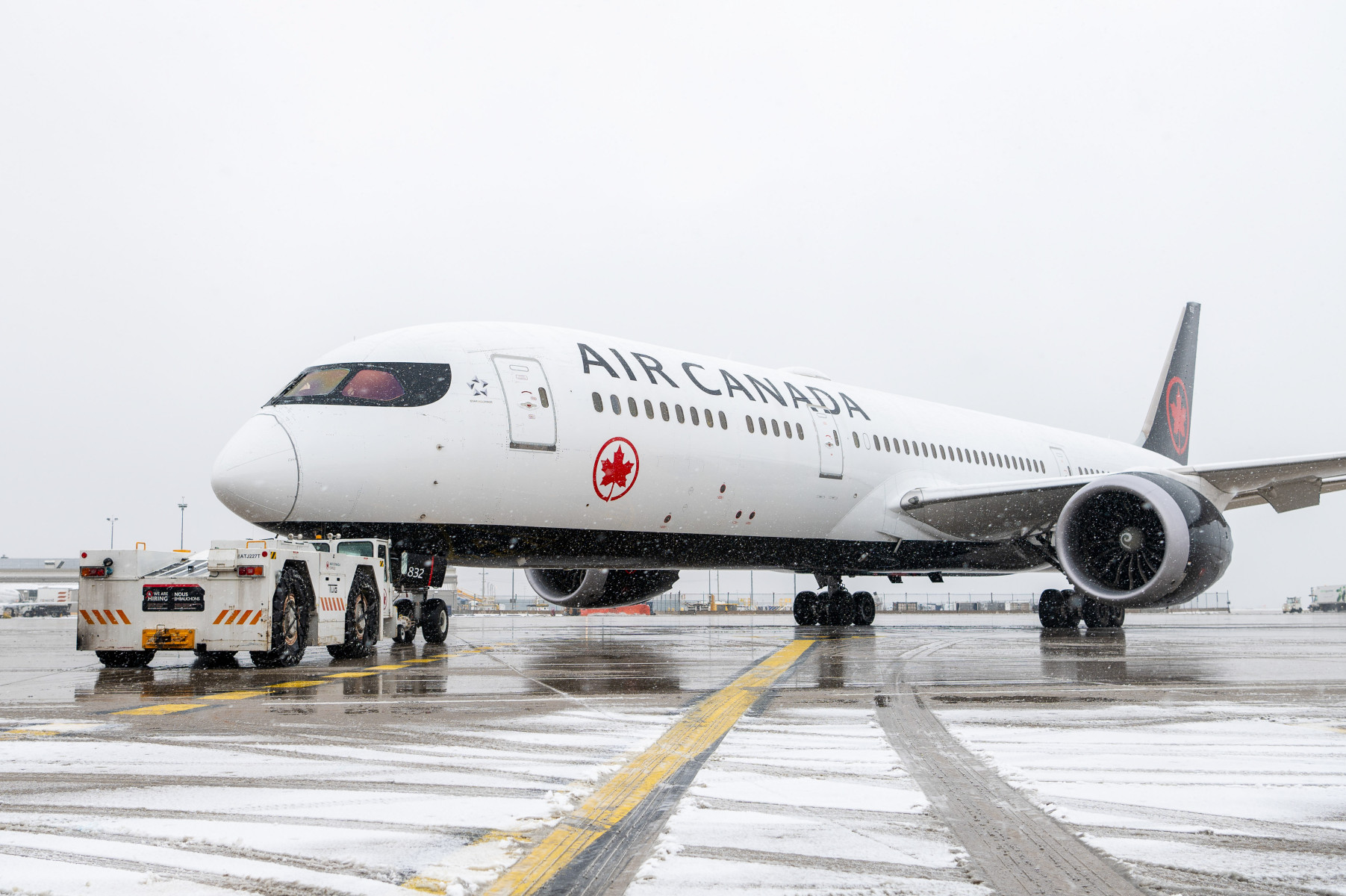Published on August 15, 2025
By: Rana Pratap
Millions of travelers are set to be stranded as Air Canada braces for a complete flight shutdown due to an ongoing labor dispute with the Canadian Union of Public Employees (CUPE), representing over 10,000 flight attendants. The strike, set to begin early Saturday, will severely disrupt operations at Air Canada, grounding an estimated 700 daily flights—affecting nearly 4,900 flights over the course of a week and impacting over a million passengers. This widespread disruption will not only leave Air Canada’s own passengers stranded but will also affect travelers flying with major international carriers like United, Lufthansa, Singapore Airlines, Turkish Airlines, and Emirates, due to the airline’s extensive codeshare partnerships and hub operations in major airports across Canada. With limited rebooking options and the peak summer travel season in full swing, the shutdown threatens to create a travel crisis felt globally.
The strike, which is set to begin early Saturday morning, will ground thousands of flights, significantly affecting not only Air Canada’s operations but also those of international airlines, many of which have codeshare and partnership agreements with the carrier. This includes major global players like United Airlines, Lufthansa, Singapore Airlines, Turkish Airlines, and Emirates. The travel chaos expected over the next several days could be one of the largest disruptions in recent airline history, and travelers will need to brace for long delays, cancellations, and limited rebooking options.
Advertisement
The Impending Flight Shutdown
Advertisement
The strike by CUPE, representing Air Canada’s flight attendants, is set to commence at 1:00 a.m. EDT (10:30 a.m. IST) on Saturday. This action is expected to paralyze Air Canada’s operations at its key hubs in Toronto, Vancouver, and Montreal, affecting both domestic and international flights. Mark Nasr, Air Canada’s Chief Operations Officer, has stated that the airline has already begun a gradual suspension of operations for both Air Canada and its subsidiary Air Canada Rouge to ensure an “orderly restart” after the strike is resolved. However, under the best circumstances, this process could take up to a week.
The initial wave of cancellations began on Thursday, with long-haul international routes being the first to be impacted. By Friday, Nasr estimated that over 100,000 customers would be affected, and 500 flights were expected to be canceled by the end of the day. The situation is expected to worsen as the full grounding of operations takes effect on Saturday, which could leave 25,000 Canadians stranded abroad, without a clear path home.
Air Canada is now projecting that 700 daily flights will be grounded starting today, which means nearly 4,900 flights will be canceled over the course of a week. This disruption will have a massive impact, potentially affecting over a million travelers during the peak of the summer travel season, when airlines typically see a surge in passenger numbers. This is especially concerning as Air Canada is the primary carrier for a significant portion of air travel in Canada, both domestically and internationally.
Impact on Air Canada’s Key Hubs
The strike and flight cancellations will have particularly severe consequences for Air Canada’s key hubs, such as Toronto Pearson International Airport, Vancouver International Airport, and Montreal Pierre Elliott Trudeau International Airport. These airports are vital gateways for both domestic and international flights and are among the busiest in the country. With operations at these hubs severely impacted, travelers will face widespread disruptions across both Air Canada’s own services and those of its partner airlines.
Toronto Pearson International Airport
As Canada’s busiest airport, Toronto Pearson International Airport is expected to experience some of the most significant disruptions. Air Canada operates a substantial portion of the airport’s flights, with routes to major cities in Europe, Asia, the U.S., and Latin America. Key routes, such as Toronto to London Heathrow, New York (JFK), Frankfurt, Los Angeles, Chicago, Paris Charles de Gaulle, and Vancouver, will see cancellations or severe delays.
Toronto Pearson serves as a major hub for international travelers and is crucial for connecting passengers from around the world. The expected grounding of 700 flights per day means that travelers will have limited options for rebooking or finding alternative routes. Passengers flying out of Toronto will need to monitor their flight statuses closely, as Air Canada has recommended that passengers not head to the airport unless they have a confirmed booking and their flight is still showing as operational. The influx of travelers looking for rebooking options will likely overwhelm other airlines, creating significant delays across the airport.
Vancouver International Airport
Vancouver International Airport, which acts as Air Canada’s primary West Coast hub, is another airport that will be heavily impacted by the strike. Air Canada operates several high-demand routes from Vancouver, including international flights to Tokyo Narita, Beijing Capital, San Francisco, New York (JFK), and London Heathrow, as well as domestic flights to Calgary, Montreal, and Toronto. These routes will face cancellations or long delays, potentially leaving thousands of passengers stranded in Vancouver or unable to reach their final destinations.
Given that Vancouver is a major gateway for travelers heading to Asia and the Pacific, the cancellation of Air Canada’s flights will disrupt not only Canadian travelers but also those connecting to or from international destinations. Many passengers from the Asia-Pacific region rely on connecting flights through Vancouver, and the airline’s limited capacity will leave them with few options for rebooking.
Montreal Pierre Elliott Trudeau International Airport
Montreal Pierre Elliott Trudeau International Airport is another crucial hub for Air Canada, and the strike will lead to significant reductions in flights to both European and U.S. destinations. Flights from Montreal to Paris Charles de Gaulle, Boston Logan, Frankfurt, Toronto Pearson, New York (JFK), Vancouver, and Calgary will all be affected by the strike. Montreal is a critical entry point for international travelers, especially those coming from Europe, so these disruptions will have a cascading effect on tourism and business travel, especially during the summer months.
The reduced capacity at Montreal’s airport will make it difficult for travelers to find alternative flights, particularly those looking to connect to other cities in Canada or internationally. As passengers are likely to experience longer wait times and limited seating options, they will face additional challenges in securing rebooked flights.
Widespread Impact Across Other Canadian Airports
While Toronto, Vancouver, and Montreal are expected to bear the brunt of the cancellations, other airports across Canada will also see a reduction in flight activity. Calgary International Airport, Edmonton International Airport, Ottawa Macdonald-Cartier International Airport, and Quebec City’s Jean Lesage International Airport are among the other airports where Air Canada’s flights will be grounded, with many key domestic routes seeing significant cancellations.
For example, Calgary International Airport, a key hub for domestic travel, will face disruptions on routes such as Calgary to Vancouver, Calgary to Toronto, and Calgary to Edmonton. These reductions will affect not only business travelers but also leisure passengers who are trying to reach their destinations for summer vacations. Similarly, Edmonton International Airport will see fewer flights, particularly on routes such as Edmonton to Vancouver, Edmonton to Calgary, and Edmonton to Toronto Pearson.
Ottawa Macdonald-Cartier International Airport and Quebec City’s Jean Lesage International Airport will also face reduced services, particularly on high-demand domestic routes. Passengers hoping to travel to or from Ottawa to Montreal, Ottawa to Toronto, or Quebec City to Paris may face significant challenges as Air Canada suspends flights on these routes.
Air Canada’s Partnership with Global Airlines
As a founding member of the Star Alliance, Air Canada has extensive partnerships with airlines around the world, allowing for seamless connections and streamlined services for international travelers. This collaboration means that disruptions to Air Canada’s services will have a cascading effect on other airlines within the Star Alliance network, including United Airlines, Lufthansa, Singapore Airlines, Turkish Airlines, and Emirates.
Travelers flying with these airlines may find themselves stranded or delayed, particularly on routes that involve connecting flights through Air Canada’s key hubs. Given the high volume of passengers affected, finding alternative routes on other airlines may prove to be challenging, as available seats will be limited, especially during peak travel times.
The disruption to the Star Alliance network is not only about flight cancellations but also about the shared loyalty program benefits that passengers lose access to when flights are grounded. Travelers who have accumulated Aeroplan points with Air Canada may struggle to redeem them for alternate flights, adding another layer of frustration to an already stressful situation.
The Pay Dispute and Its Underlying Causes
The strike by Air Canada’s flight attendants stems from a labor dispute over pay and working conditions. The Canadian Union of Public Employees (CUPE) claims that flight attendants are working under conditions that involve “poverty wages” and unpaid labor, particularly for tasks performed when planes are not in the air, such as boarding and standby duties at airports.
At a news conference, some flight attendants held signs reading “Unpaid work won’t fly” and “Poverty wages = UnCanadian”. The union is demanding that Air Canada significantly improve compensation and working conditions for its flight attendants. While Air Canada has offered a 38% total compensation increase over four years, including benefits and pensions, the union rejected binding arbitration and is pushing for a contract that its members can vote on. The company remains open to talks, but as of now, a resolution has not been reached.
The Impact on Business and Leisure Travel
The labor dispute, combined with the subsequent flight cancellations and delays, will have far-reaching consequences for both business and leisure travelers. Business travelers, particularly those relying on international routes, will face challenges attending meetings, conferences, and corporate events. The disruptions will particularly affect those traveling between North America, Europe, and Asia, where Air Canada plays a critical role in ensuring timely connections.
Leisure travelers are also set to experience significant difficulties. Many families are traveling for vacations, and those with plans for summer holidays may find themselves unable to reach their destinations. Some may have to cancel important events, such as weddings or family reunions, due to the uncertainty surrounding flight availability.
Code Sharing: How Air Canada Collaborates with Partner Airlines
Code sharing is a practice where airlines collaborate to offer joint flights, providing passengers with more route options and greater flexibility. On flights where Air Canada has teamed up with another airline, you’ll notice the flight number starts with AC (the airline’s designator code), but the flight itself is operated by one of Air Canada’s codeshare partners, some of which are also members of the Star Alliance.
Air Canada has 38 codeshare partners, including major airlines such as Aegean Airlines, Aer Lingus, airBaltic, Air China, Air Dolomiti, Air India, Air New Zealand, ANA, Asiana Airlines, Austrian Airlines, Avianca, Azul Linhas Aereas Brasileiras, Brussels Airlines, Cathay Pacific, Central Mountain Air, Croatia Airlines, Discover Airlines, Edelweiss, EGYPTAIR, Emirates, Ethiopian Airlines, Etihad Airways, Eurowings, EVA Air, Flydubai, GOL Linhas Aereas, LOT Polish Airlines, Lufthansa, Middle East Airlines, Singapore Airlines, SriLankan Airlines, Swiss International Air Lines, South African Airways, TAP Air Portugal, THAI Airways, Turkish Airlines, United Airlines, and Virgin Australia. By flying with one of these airlines, travelers can enjoy seamless connections and shared benefits, such as loyalty points across different carriers. These partnerships also provide passengers more options for rebooking in case of cancellations or delays, allowing for smoother connections even when faced with disruptions.
With over 700 flights canceled daily and no immediate end in sight, the travel experience is set to become more stressful, chaotic, and expensive for many. As airports become crowded and the backlog of passengers seeking rebookings grows, those who can’t find alternative flights may face extended wait times and potential refunds.
Millions of travelers are set to be stranded as Air Canada faces a complete flight shutdown amid a strike by flight attendants, grounding 700 daily flights and affecting over 4,900 flights in one week. The strike will disrupt operations not only for Air Canada but also for Star Alliance partners like United, Lufthansa, Singapore Airlines, and Turkish Airlines, leading to widespread cancellations and delays globally.
The ongoing labor dispute between Air Canada and the Canadian Union of Public Employees (CUPE) has led to a massive disruption of air travel, grounding flights, and stranding millions of passengers. The shutdown of 700 daily flights, including key international and domestic routes, will affect travelers flying with Air Canada as well as partner airlines within the Star Alliance network. Travelers must prepare for long delays, cancellations, and difficulties securing alternative flights as airports like Toronto Pearson, Vancouver, and Montreal become overwhelmed.
The airline’s efforts to offer full refunds, rebookings, and alternative flights are commendable, but with more than 4,900 flights expected to be canceled in the coming week, the challenges facing travelers are immense. As the dispute continues, passengers hope for a swift resolution, but with the summer travel season in full swing, the immediate future of air travel remains uncertain. The global impact of this strike is undeniable, and passengers must be prepared for potential changes to their travel plans in the coming days.
Advertisement
Tags: Air Canada, Airline News, Strike, Travel News, United
Advertisement
Tags: Air Canada, Airline News, Strike, Travel News, United
I want to receive travel news and trade event update from Travel And Tour World. I have read Travel And Tour World’sPrivacy Notice.
Friday, August 15, 2025
Friday, August 15, 2025
Friday, August 15, 2025
Friday, August 15, 2025
Friday, August 15, 2025
Friday, August 15, 2025
Friday, August 15, 2025
Friday, August 15, 2025




